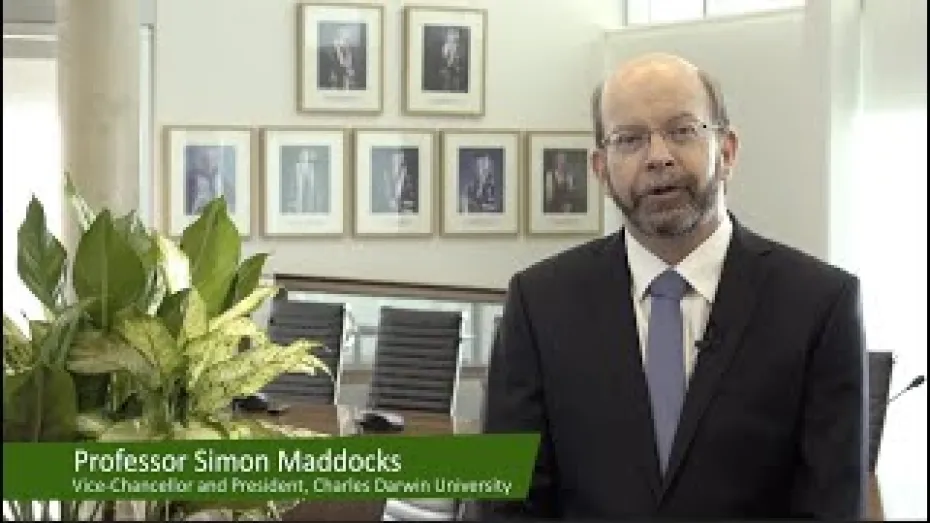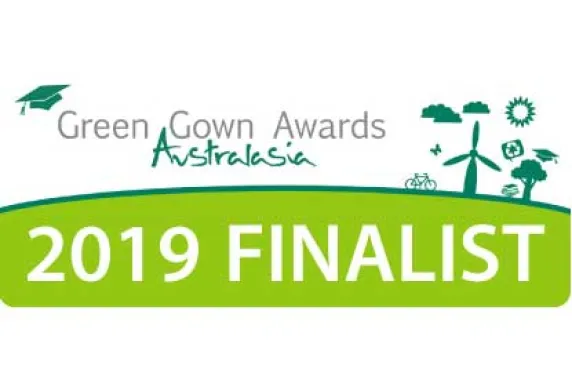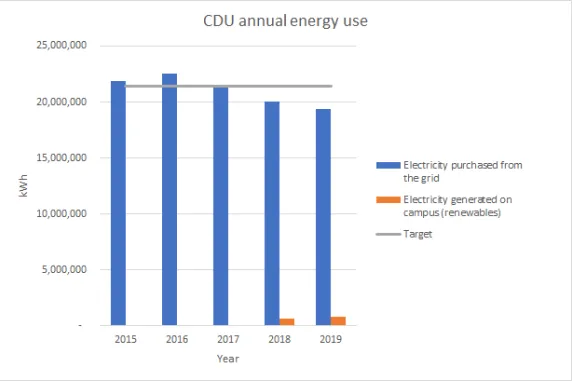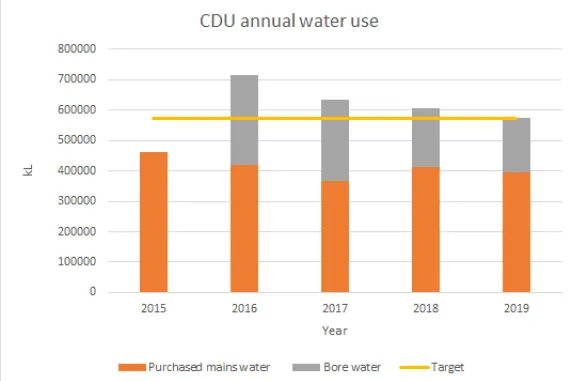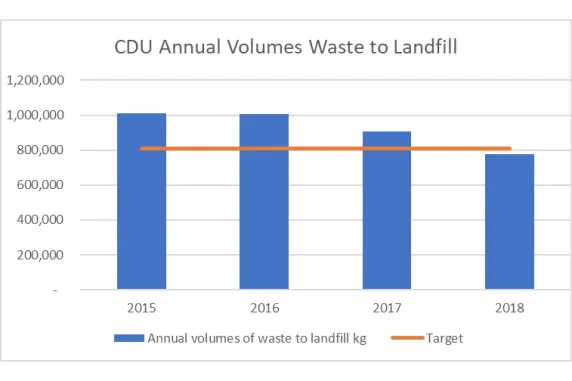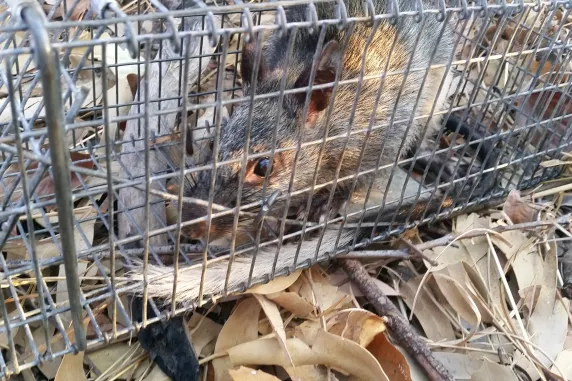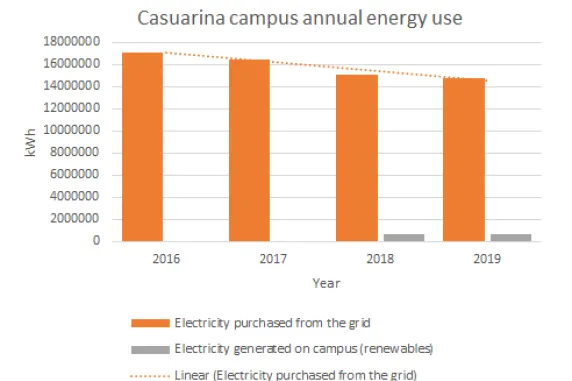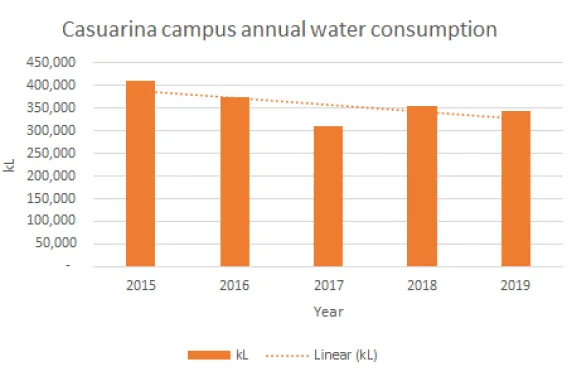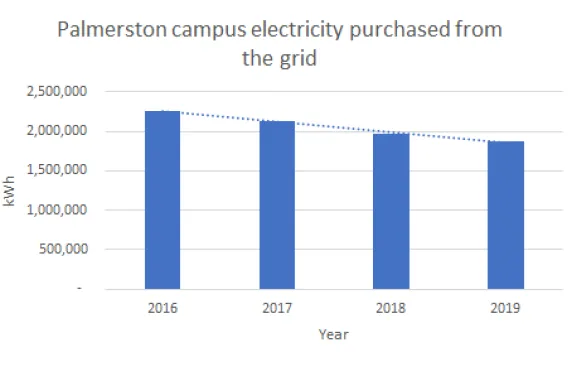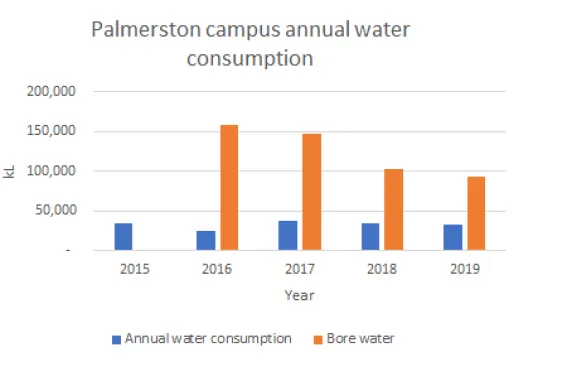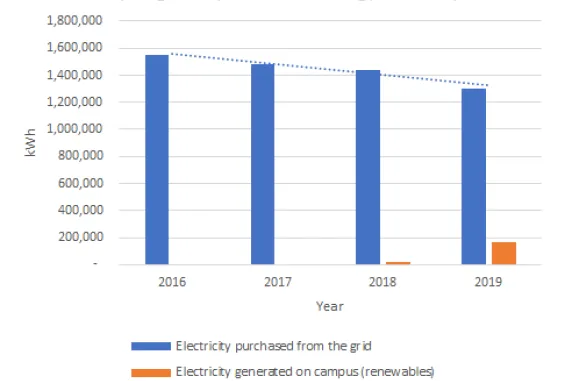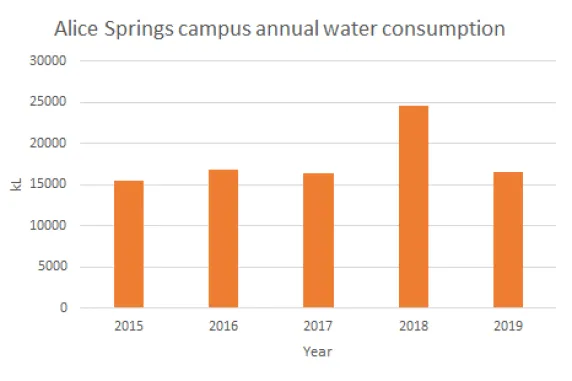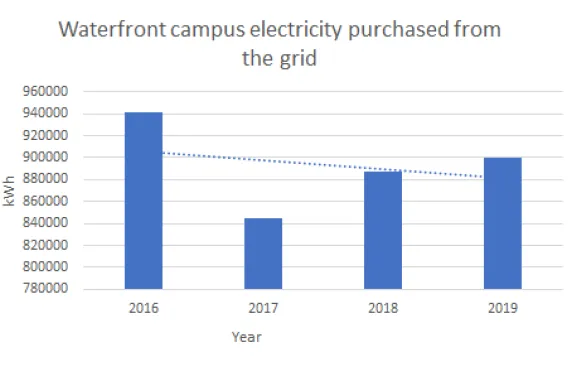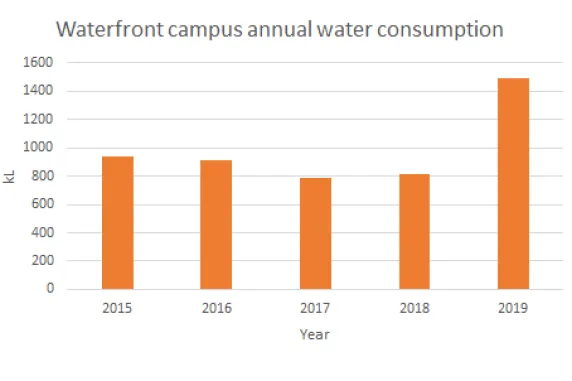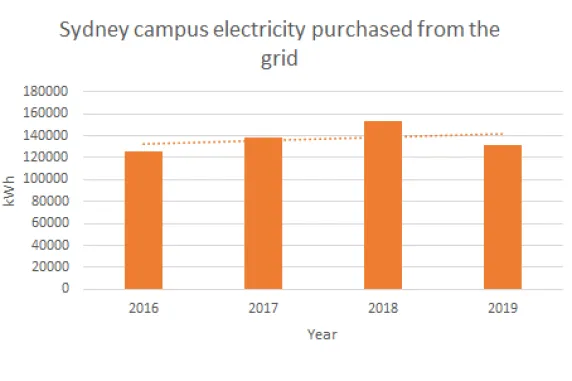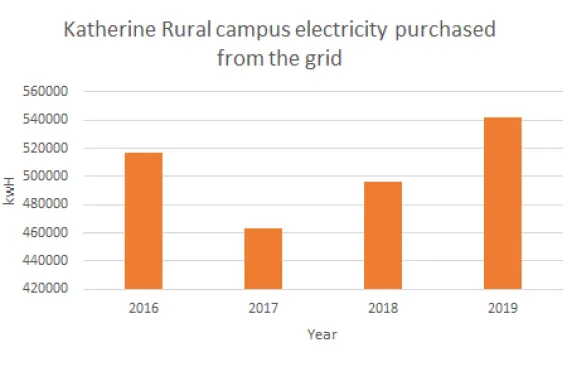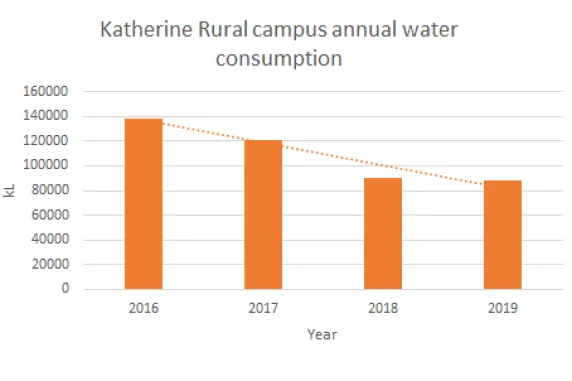
At CDU improving our sustainability and contributing to Global progress against the United Nations’ Sustainable Development Goals is embedded across our research, teaching and operations, and community engagement. A summary of CDU’s 2023 key achievements are outlined in the 2023 University Annual Report.
A highlight of CDU’s Research Impact against the United Nations Sustainability Development Goals can be viewed via the video below.
Awards
Environment and Conservation Award NTNRM - 2020 Winner Envirocollective 'Conservation on Campus'
The Envirocollective won the Environment and Conservation Award at the 2020 NT Natural Resource Management Awards night for their long-running Conservation on Campus project.
Activities have included:
- cane toad management
- feral cat education events and actively campaigned for greater campus feral animal management
- native plant identification walk and promotion of planting native species with a focus on why they are important to the local Endangered Black Footed Tree Rat
- Gamba Grass eradication
- campaigning for a student representative on the CDU Student Council and on the CDU Sustainability Leadership Group
- engagement with external stakeholders such as Darwin Wildlife Sanctuary, Birdlife Top End, City of Darwin, Climate for Change, Inspired NT, Power and Water Living Water Smart, Territory NRM, Friends of Casuarina Coastal Reserve and local experts.
- engagement with internal stakeholders such as Northern Institute Aboriginal Cosmology researchers, Research Institute of Environment and Livelihoods researchers, and CDU Facilities Management.
Green Gown Award - 2019 Finalist Charles Darwin University
The Creating Impact category recognises institutions that have achieved significant sustainability-related outcomes, on-campus or within their community, using minimal and/or limited resources. Initiatives need to demonstrate the relationship/link between the number of resources used (for example staffing, budget, time) and the level of impact achieved (for example quantifiable changes in behaviours and/or reportable metrics). Initiatives could include: those which can demonstrate significant sustainability achievements (such as sustainable products, processes or learnings) in a relatively short period and/or with a restricted budget, and/or with a small staff base e.g. good progress from a low base. Projects that raise the broader profile of sustainability will be particularly favoured.
Applications must show how learning from others has been implemented and for the greater chance of success go beyond legal compliance. Initiatives can cover a single aspect of sustainability or have multiple foci, including but not limited to: facilities & operations; learning & teaching, research; leadership and governance; community; procurement, and; engagement. However, regardless of the topical focus, the primary aim of this category is to demonstrate how institutions can still achieve creative and high impact outcomes with limited resources.
CDU has been shortlisted for its application Guerrilla Gardening:
How the cultivation of mutually beneficial relationships has enabled CDU’s Facilities Management to achieve targets without a ratified Sustainability Plan.
CDU started its journey towards sustainability in 2013 by developing, through engagement with staff and students, a draft CDU Sustainability Plan.
Facilities Management, in anticipation of ratification of the plan, seized opportunities to improve its sustainable practices and this has resulted in significant sustainability improvements across a number of areas, many of which could not have been achieved without the assistance of the staff and students in other fields.
The following information is part of a larger application providing financial, social and student impact.
SDG 7: Affordable and Clean Energy
Energy targets: Increase use of renewable energy to at least 10% of all NT campus energy requirements by 2020; Reduce overall non-renewable energy use at NT campuses by 2020 by at least 5% compared with 2016.
- CDU has reduced its energy use by 11% since 2015 across 6 campuses/centres.
- CDU has 3% renewable energy use compared with total requirements. (In 2017 this was the 3rd highest of any University in Australia (2017 TEFMA)).
- LED lighting installed across Sydney campus and new buildings. Replacements with LED elsewhere with large-scale replacement proposed.
- Working with Engineering students and staff to improve HVAC efficiency and heat mitigation on our campuses.
- Working with the Centre for Renewable Energy to increase CDU's campus generated renewable energy.
SDG 15: Life on Land
Biodiversity targets: Increase carbon sequestration on CDU properties through planting; All biodiversity conservation areas on CDU campuses are identified and appropriately managed by 2020.
- 3000 native trees planted during 2017 - 2019 through working with Conservation and Land Management lecturers and students, Greening Australia and Conservation Volunteers.
- Biodiversity survey scoped with Environment staff and other environmental advice provided by staff and students.
- Provision of possum boxes by Facilities Management working with an Environment research student.
- Undertaking regular toad busts, weed and pest management. Toad busts were initially conducted by Conservation Volunteers and have been recently undertaken by Conservation and Land Management students. They will be undertaken for the bulk of the coming year by the Envirocollective.
- Creation of flood mitigation drains and berms, removal of substantial areas of the weed 'coffee bush' by working with Civil Construction lecturers and students.
SDG 11: Sustainable Cities and Communities
Recycling and waste minimisation target: Reduce the total volume of CDU waste to landfill in 2020 by 20% compared to 2015.
- 29% combined decrease 2015 – 2019 in waste-to-landfill on Casuarina, Palmerston and Waterfront campuses
- Removed emptying of desk bins from cleaning contract and improved waste stream reporting. Simultaneously undertook change management communications and actions to aid implementation including the introduction of “Recycling Champions”.
- Waste from food preparation from both CDU food retailers is sent to the Lakeside Drive Community Garden (on CDU leased land) for compost. This had led to other retailers from surrounding areas approaching the LDCG to learn how to undertake their own composting.
- CDU has also supported fundraising for community groups using the Cash for Containers scheme, eg Down Syndrome Association of the Northern Territory, and supported the FM staff-led: ‘Too Much Stuff’, Darwin’s only upcycling, recycling Flea Market.
SDG 6: Clean Water and Sanitation
Water target: By 2020 reduce overall water consumption by 20% compared with 2015.
- Water consumption decreases 2015 – 2018: Casuarina Campus 13%, Palmerston Campus 26% (Irrigation bore water decrease 36%) and Waterfront Campus 12%.
- The 2017 Water Management Plan developed by Living Water Smart (Power and Water) suggested various changes including smart controller irrigation systems, water-saving devices and better water management which have been implemented.
Top three learnings:
- We made a start internally on almost all of our sustainability initiatives, no matter how small, as a basis to build interest and momentum as we went along.
- We engaged early with our organisational community to build commitment and buy-in to our sustainability initiatives.
- We developed mutually beneficial sustainable goals with members of our organisational community.
Australian Community Media Landcare Community Group Awards - 2019 Winner Lakeside Drive Community Garden
Lakeside Drive Community Garden was started by CDU students over 10 years ago. It is a holistic, productive and sustainable garden that incorporates natural habitats and ecosystems. It provides regular workshops and community events focus on sustainable living, sharing skills, knowledge and building a stronger community. It is located on CDU leased land and a variety of support is provided to the garden by CDU.
NT Natural Resource Management Awards - 2019 Finalist 'TOO MUCH STUFF'
TOO MUCH STUFF is a CDU supported event - Darwin's only upcycling, recycling flea market - held on CDU grounds once a month. TOO MUCH STUFF was nominated in the Sustainable Enterprise Award category. It was co-founded by CDU's Facilities Help Desk Coordinator Esther Lloyd-Taylor who has received the following accolades for her efforts in promoting sustainable practices:
- Nominated 2020 Northern Territory Community Achievement Awards
- Nominated 2020 NT Volunteer of the Year Awards
- Nominated in 2020 Australian of the Year Awards
- Shortlisted in 2019 Local Hero Australian of the Year Awards
- Winner 2018 Ryan Family Award.
Yali McNamara Award - 2018 Winner Blue 2 building
The $30 million complex was ‘officially’ opened at the Charles Darwin University Casuarina Campus on 26 April 2012, by the then Prime Minister Ms Julia Gillard.
In 2014 Charles Darwin University was recognised for championing sustainable building practices in the Northern Territory.
The university received a nationally recognised Green Star rating for the iconic Blue 2 Indigenous Leadership precinct on Casuarina campus.
The sophisticated facility received a 4 Green Star Education Design v1 certified rating from the Green Building Council of Australia for its environmentally sustainable building practices.
The building’s design featured superior sustainable technologies, such as set-point air-conditioning and motion triggered, low energy lighting.
Water captured from the building’s air-conditioning system is reused in the outdoor ponds, waterfall and garden, and recycled rainwater is reused in the building’s toilet facility and garden.
The building’s physical placement takes advantage of the surrounding environment and shields it from the western sun. Bamboo flooring, environmentally friendly paint, sustainable furniture and carpet are used throughout the facility.
In 2018, the redesign of the Ceremonial Space won the Yali McNamara Award at the Australian Institute of Architects NT Awards.
The redesign project consists of a new ceremonial space, seating and woven shading structures which dramatically improve the usability and experience of this important cultural meeting place. Individual elements take inspiration from the surrounding cultural, natural and built environments. The careful use of colour, material and built form was significant to create harmony with and enhance the comfort of the ceremony space, providing a culturally relevant and vibrant space for the community.
The complex has awesome environmental credentials and minimizes its carbon footprint by;
- capturing run-off and condensate, and recycling this water in appropriate ways throughout the complex, for the flushing of toilets and the like;
- reducing power costs and keeping the use of electricity to a minimum, by automating lighting to all rooms with “daylight harvesting”;
- maximising airflow and use of natural light in all areas possible;
- using “green” star-rated furniture, furnishings and materials throughout the complex;
- and, recycling and composting of waste, amongst other things.
CDU sustainability by campus location
CDU Totals
CDU is making sustained efforts to have more sustainable campuses. However fluctuations in results should be viewed in the context of the natural environment. Biodiviersity has natural cycles and water and energy use fluctuate greatly depending on the humidity, rainfall and temperature. Climate summaries for each year are found on the Bureau of Meterology site.
Energy
Target: Reduce overall non-renewable energy use at NT campuses by 2020 by at least 5% compared with 2016.
Result: Reduction of 13.8% between 2016 - 2019.
Data includes Casuarina, Palmerston, Alice Springs, Waterfront, Sydney and Katherine Rural College Campuses.
Water
Target: By 2020 reduce overall water consumption by 20% compared to 2015.
Result: Reduction of 19.7% over 2016 - 2019. (The opening figure is from 2016 as 2015's bore water figure is unavailable.)
Water volumes calculated on Casuarina, Palmerston, Alice Springs, Waterfront and Katherine Rural College campuses. An increase was seen on several campuses in 2018, mostly due to large water leaks.
Recycling and Waste Minimisation
Property and Facilities Services has reviewed and improved our procedures for managing and quantifying CDU's waste, and as a result, our 2019 figures do not conform to previous year's metrics. We will be establishing a new baseline in 2020.
Target: Reduce total volume of CDU waste to landfill in 2020 by 20% compared to 2015.
Result: 29% reduction in waste to landfill 2015 - 2018
Recycling and waste minimisation has only been implemented on Casuarina, Palmerston and Waterfront campuses.
University Cleaning
- The University’s contracted cleaning provider uses the ISO 14001 Environmental Management Systems standard, is a registered member of the Green Building Council of Australia, and uses processes aligned with Good Environmental Choice Australia (GECA) to drive sustainable cleaning practices.
- Toilet paper, tissues and paper towel supplied by cleaners at Charles Darwin University are all Forest Stewardship Council (FSC) certified. This includes using a mix of recycled material and pulp sourced from sustainable timber plantations.
- Chemicals used are Green Seal Certified, and are fully biodegradable wherever possible and closest to neutral pH value compatible for the use for which they are intended so as to minimise impact on the environment.
- Chemicals are dispensed using automated systems that ensure the right concentration of each product at all times, avoid waste of both chemicals and water.
- Cleaners receive a Green Cleaning Training Program prior to commencement on site, addressing energy & water conservation, paper reduction, chemical minimisation, waste disposal & recycling, and spills management.
- The University’s cleaning contract requires operational sustainability measures and identification of improvements to practices and methodology. There are regular meetings with the contractor where opportunities identified by either party are discussed to implement ongoing improvements.
Casuarina
- Biodiversity
-
Planted 3000 new plants on campus through the Land for Wildlife Program during 2017 - 2019. Plants have been selected by Greening Australia to be suitable for the Endangered Black-footed Tree Rat. Plants have been planted and maintained in a combined effort by Civil Training Students, Conservation and Land Management Students, Conservation Volunteers and Facilities Management staff.
- Oveer 40 possum and rat nest boxes, and several black-cockatoo nesting boxes, installed on campus and beside southern walking track in a combined effort between Environment and Facilities Management staff.
- Casuarina Campus is located to the south of the Shoal Bay site of Conservation Significance which is of international importance due to its birdlife. Data on campus birds is on Ebird.
- If you would like to participate in the monitoring of species on campus, or view species already recorded, download the app iNaturalist. The NT Field Guide app developed by the Musuem and Art Gallery of the NT with Museum Victoria is also a useful tool.
- Weed management plans in place to control gamba, mission grasses and others. Significant decreases in Gamba grass has been seen on Casuarina campus. 2018-19 Weed Management Plan (PDF, 7.71 MB) (PDF, 7.71 MB)
- A 2018 survey via students of ENV209 Flora and Fauna Survey and Monitoring of the savanna woodland near Yellow 2 found that 5 mammal, 8 reptile and 16 bird species were observed in this area of campus. There are three known threatened species on campus.
- A 2019 walk through of the western bushland on campus by the Envirocollective yielded the following species Acacia auriculiformis, Acacia dimidiata, Alstonia actinophylla, Brachychiton megaphyllus, Brachychiton paradoxum, Brachychiton diversifolius, Buchanania obovata, Cochlospermum fraseri, Cycas armstrongii, Exocarpus latifolius, Eucalyptus tetrodonta, Ficus opposita, Livistona humilis, Persoonia falcata, Pandanus spiralis, Planchonia careya, Gardenia megasperma, Grevillea decurrens, Pittosporum melanospermum, and Smilax sp.
- Trapping of non-native species occurs when reported.
-
- Energy
- Nearly 14% decrease in energy use across campus during 2016 - 2019.
- 6 electric car parking bays with rooftop solar array.
- 400KW of solar arrays across a number of buildings, equivalent to 3% of energy use. Technological barriers holding up further array deployment.
- New buildings with LED lighting and fittings replaced with LED where possible.
- Blue 2 is a 4 green star rated building.
- Red 9 and Orange 12 have various heat and energy use attributes including solar and LED lighting.
- Smart meters on most buildings.
- Fleet management monitoring.
- Water use
- Decreased by 16% over 2015 - 2019. An increase in 2018 was due to a leak in a chiller plant pipe that was found in a combined effort by Facilities Management and an Engineering student. A multi-day partial shut down of air-conditioning systems on campus was required to fix the leak.
- Smart irrigation controllers installed to enable wifi control and better leak identification.
- Weather station on Orange 4 has been installed to provide local weather information that connects to smart controllers.
- Showers, taps and other smart water saving devices have been installed around campus upon advice by Living Water Smart
- Waste Management
- Recycling program decreased waste to landfill by 22% over the period 2015 - 2018. A new baseline will be established in 2020.
- Some recycling bins support the charity Down Syndrome Australia.
- Compost bins operating at various locations on campus.
- Store of quality furniture for reuse.
International House Darwin Accommodation
- Solar Hot water systems throughout campus accommodation.
- Recycling program implemented.
- Encouragement of active and public transport by students.
- Free bike loans to students and secure bike lock-ups.
Palmerston
- Biodiversity
- Weed management plan implemented. 2018-19 Weed Management Plan (PDF, 855.24 KB) (PDF, 855.24 KB)
- Energy
- Decreased energy use (2016 - 2019) by over 17%.
- Encouragement of active and public transport.
- Water
- Decreased overall water use by 32% and bore water use by 41% (2016 - 2019) through replacement of pumps and better management.
- Recycling and Waste Management
- Recycling program decreased waste to landfill by 42% (2015 - 2018). A new baseline will be established from 2020.
Alice Springs
- Energy
- 100KW solar installed on new Trades Skills Centre building.
- Gradual LED lighting replacement.
- 16% decrease in energy use over 2016 - 2019.
- Encouragement of active and public transport.
- Water
- A large leak was found on Alice Springs campus contributing to the increase in water use in 2018. A 7% increase has been seen in the period 2015 - 2019.
- Non potable water is used for irrigation whenever possible.
Darwin Waterfront
- Energy
- All lights LED.
- Encouragement of active and public transport.
- 4.3% decrease 2016 - 2019. The Waterfront has seen changes to its occupation use including an increase in population.
- Water
- A 63% increase in water use has been seen over (2015 - 2019). This substantial increase can be partially explained by a change in occupation, but is being investigated.
- Waste
- A new recycling and waste minimisation baseline will be established in 2020.
Sydney
- Energy
- All lights on campus were converted to LED at the end of 2018/beginning of 2019. Increase in energy use due to CDU taking on additional space in the building, including level 9 in 2016, and half of level 11 in 2017. At the end of 2019, energy use had increased 4% over 2016 figures.
- Encouragement of active and public transport.
Sydney is a leased campus and therefore no data is currently available on water consumption and recycling/waste.
Katherine Rural College
- Biodiversity and farm management
- Fire management and weed management plans.
- Stud management plan.
- Energy and climate change
- Nearly 5% increase in electricity consumption over 2016 – 2019. This can be explained by higher than usual use of the facilities.
- Staff have been monitoring and sampling ant colonies on behalf of University of New England researchers studying the effects of climate change. This study has now come to completion.
- Water
- Water consumption decreased by 36% in 2016 – 2019.
No recycling facilities are currently available in Katherine.
